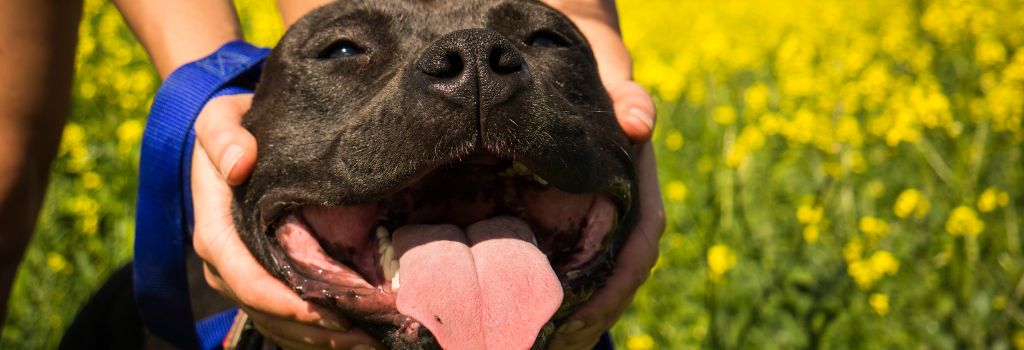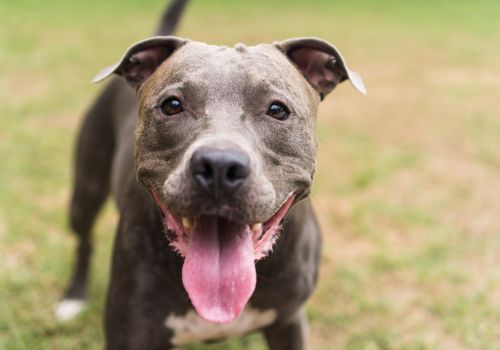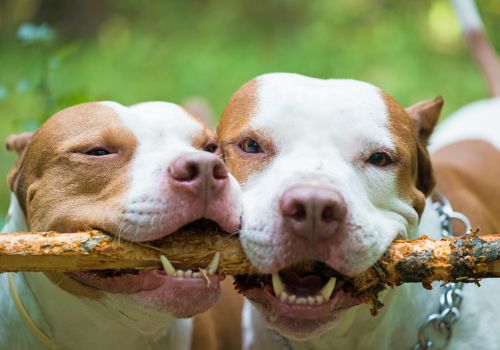Isn't it amazing to share your life with a dog that's not just any dog, but an American Staffordshire Terrier (better known as the American Pit Bull)? Let's celebrate the pawsomeness that is your four-legged friend and dive into what makes them tick (in a good way, of course!).
What You Adore About Your Pit
If you've got a Pit Bull by your side, you likely picked this fabulous breed for its outstanding qualities. Expect cuddles and tail wags galore because Pits are super affectionate! They're little social butterflies—friendly and always aiming to please you. Plus, they're smart cookies who catch on quick. Got a cozy apartment? No worries! Pits are compact enough to make perfect roomies, even in smaller spaces. And let's not forget that easy-peasy coat, so sleek and simple to care for.
But, Hey, Nobody's Perfect!
Love 'em as we do, Pits come with their own quirks and challenges:
- They love food and can pack on the pounds if they're not regularly exercised and properly fed.
- Training and socialization from a young age? Absolutely essential!
- Unsuspecting postman, beware! They can be territorial if not well-socialized.
- Small critters might want to steer clear unless your Pit has been trained to be a gentle giant.
While generally good with humans, some Pits might need a watchful eye around kids.

Despite these quirks, they're worth every bit of effort. All they need is some daily playtime and consistent boundaries to thrive in almost any living situation!
A Brief History Lesson
Did you know that the American Pit Bull Terrier has roots across the pond? Yep, they came to America with immigrants from England, Ireland, and Scotland back in the 19th century. Once here, selective breeding gave them a more "oomph" look, especially in the head department. Though they were originally farm dogs and even bull baiters, today they're one of the most cherished companions you can have.
Health Watch
Generally speaking, Pits are a hardy bunch, with a lifespan ranging from 12-14 years. But keep an eye out for some common issues like hip dysplasia and allergies. The mantra for keeping your Pit in tip-top shape? Early diagnosis and regular vet check-ups.

Genetic Predispositions for American Pit Bull Terriers
Hips and Elbows: Watch for the Wobble
Have you ever noticed your Piitbull having a bit of trouble getting up or limping slightly? This could be a sign of hip or elbow dysplasia, a genetic condition that affects joint formation and can lead to arthritis. An X-ray can spot these issues early, and treatments for arthritis can make a world of difference in comfort levels. Just a little heads-up: carrying extra weight can make this condition worse, so let's aim for a healthy, balanced diet!
Knee Quirks: Patellar Luxation
Picture this: your Pit is zooming around, and suddenly, he starts to hop on one leg. What gives? It could be patellar luxation, a condition where the kneecap slips out of place. If it's a mild issue, medication for arthritis might be all he needs. But if it’s severe, a trip to the doggy orthopedic surgeon could be on the cards to help keep that knee stable.
The Thyroid Tango: Hypothyroidism
If your Pit seems to be gaining weight or shows changes in behavior, don't just brush it off. It could be hyperthyroidism, a condition where the thyroid doesn't produce enough hormones. Annual blood tests can catch it early, and treatment usually involves a simple hormone pill.
Itch Alert: Atopy and Allergies
Ever seen your doggo obsessively licking their paws or getting frequent ear infections? Your Pit may be allergic to things like pollen or dust. Instead of sneezing like us humans, their skin gets itchy, mostly affecting their feet, belly, and ears. The upside? Many treatments can help your pup find relief!
Pesky Mites: Mange
Demodex mites are microscopic critters that live in a dog's hair follicles. They’re usually harmless, but some Pits can get an overload of these mites, leading to hair loss and irritated skin. Early vet intervention can help manage the condition, and many dogs even outgrow the issue.
The Zinc Zinger: Zinc-Responsive Dermatosis
Signs like red, scaling skin around the mouth or nose could indicate that your Pit isn't absorbing enough zinc. With the right amount of zinc in his diet, prescribed by a vet, this skin condition can be managed effectively.
The Flaky Situation: Ichthyosis
Imagine your pup’s skin resembling fish scales—that's ichthyosis for you. It’s an inherited condition, and there’s no cure, but treatments like special shampoos and fish oils can offer relief. If you're planning on breeding, a genetic test can help you make informed decisions.
Nerve Troubles: Neuronal Ceroid Lipofuscinosis (NCL)
This is a neurologic condition that usually shows up in young Pits. Symptoms can range from rear leg weakness to vision loss. Currently, there's no effective treatment, and dogs with this genetic issue should not be bred.
Wobbly Pup: Cerebellar Abiotrophy
If you notice your Pit pup showing signs of imbalance or uncoordinated movements, it could be cerebellar abiotrophy, a genetic neurologic disorder. Unfortunately, no treatment is available and affected dogs should not be used for breeding.
Stone Alert: Bladder and Kidney Stones

Pits are more prone to accumulating uric acid in their urine, which can lead to bladder stones or even kidney stones. DNA tests can identify this risk early, so you can start dietary therapy to prevent those painful stones.
The Oral Issue: Cleft Lip or Palate
Some Pits may be born with a cleft lip or palate. While mild cases may not need intervention, serious defects often require surgical repair to prevent complications.
The Sight Snag: Progressive Retinal Atrophy (PRA)
This genetic condition could make your Pit go blind over time.Progressive retinal atrophy, though not curable, early detection via a genetic test can prepare you for the changes in your dog’s life.
The Parvo Precaution: Parvovirus
Parvovirus is a serious viral infection that’s especially dangerous for puppies. Symptoms include vomiting, bloody diarrhea, and fever. Your Pit needs an extra Parvo vaccine booster about a month after the usual puppy vaccine series and should get a yearly booster afterward.
If you have questions and you'd like to reach out to us, you can call us directly at (518) 620-5154, or you can email us at [email protected]. Don't forget to follow us on social media Facebook, Instagram

